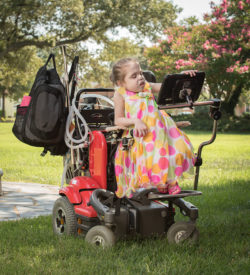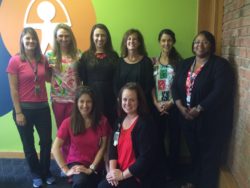
Imagine being unable to communicate with those around you. While illness, injury and congenital conditions make this a reality for some, our assistive technology team dedicates their life’s work to helping them overcome it. The team’s commitment and passion for what they do has earned them the 7th Annual McLean Yoder Award for Professional Excellence, which honors those who support the communication needs of people with severe disabilities.
Communication support system
 The AT program provides evaluations, equipment and training for people of all ages, enabling children and adults with disabilities to function more independently. Through an augmentative and alternative communication evaluation, speech-language pathologists and occupational therapists work as a team to assess an individual’s access and communication needs in order to determine a system that will allow them to express their opinions, wants and needs. Following evaluation, the goal is to implement the technology and provide the support needed to achieve the most effective communication possible.
The AT program provides evaluations, equipment and training for people of all ages, enabling children and adults with disabilities to function more independently. Through an augmentative and alternative communication evaluation, speech-language pathologists and occupational therapists work as a team to assess an individual’s access and communication needs in order to determine a system that will allow them to express their opinions, wants and needs. Following evaluation, the goal is to implement the technology and provide the support needed to achieve the most effective communication possible.
One of the team’s missions in recent years has been to enhance education for caregivers, families and other professionals.
“When it comes to assistive technology, a lack of support for caregivers often leads to device abandonment,” says Barbara Lent, speech-language pathologist and manager of the assistive technology team. “Technology can be life-changing but if individuals and caregivers don’t know how to use it in a functional way on a daily basis, the devices get stuck in a closet and forgotten about.”
A recipe for success
The Recipes for Success program was established by the AT team to help in this education process. The program is designed to identify a particular activity or routine in a person’s daily life and give families ideas how to incorporate communication devices into that routine. The therapists use a coaching method to help families practice with the technology during therapy sessions so they have a comfort level when transitioning to the home environment.
The team’s hub is at our Brook Road campus. Following comprehensive evaluation at this site, they strive to collaborate with health care professionals, educators and caregivers who can provide ongoing support in the patients’ own communities. This helps to ensure that patients can get the care they need in a timely and convenient manner. As leaders in their field, the AT team has developed robust training for these individuals in the form of videos and lunch and learn sessions internally, and a comprehensive AT Symposium for providers throughout the region. Because many of the patients requiring AT have complex medical needs, the team also works closely with school systems for comprehensive planning and treatment.
“This team is extremely hard working and passionate about assistive technology and using evidence-based practice in providing communication supports for our patients. Everyone was really excited to learn about the award. Receiving recognition from an independent agency affirms for us that we are doing the best we can for these kids and adults,” adds Lent.
Improving all the time

The team is not content to stop learning, or teaching! They regularly attend and present at professional conferences with the Assistive Technology Industry Association, American Speech-Language-Hearing Association and others to stay current on the latest technological advances in this ever-changing field.
The advent of more commercially available supports, such as tablets, has been a game changer for many patients. Other advances in access methods, such as eye gaze technology, are improving and becoming more readily available all the time.
“It’s an incredible time in the world of assistive technology and augmentative and alternative communication,” concludes Lent. “Every new advancement better equips us to help people express their feelings and gain independence, and that’s a wonderful thing.”
